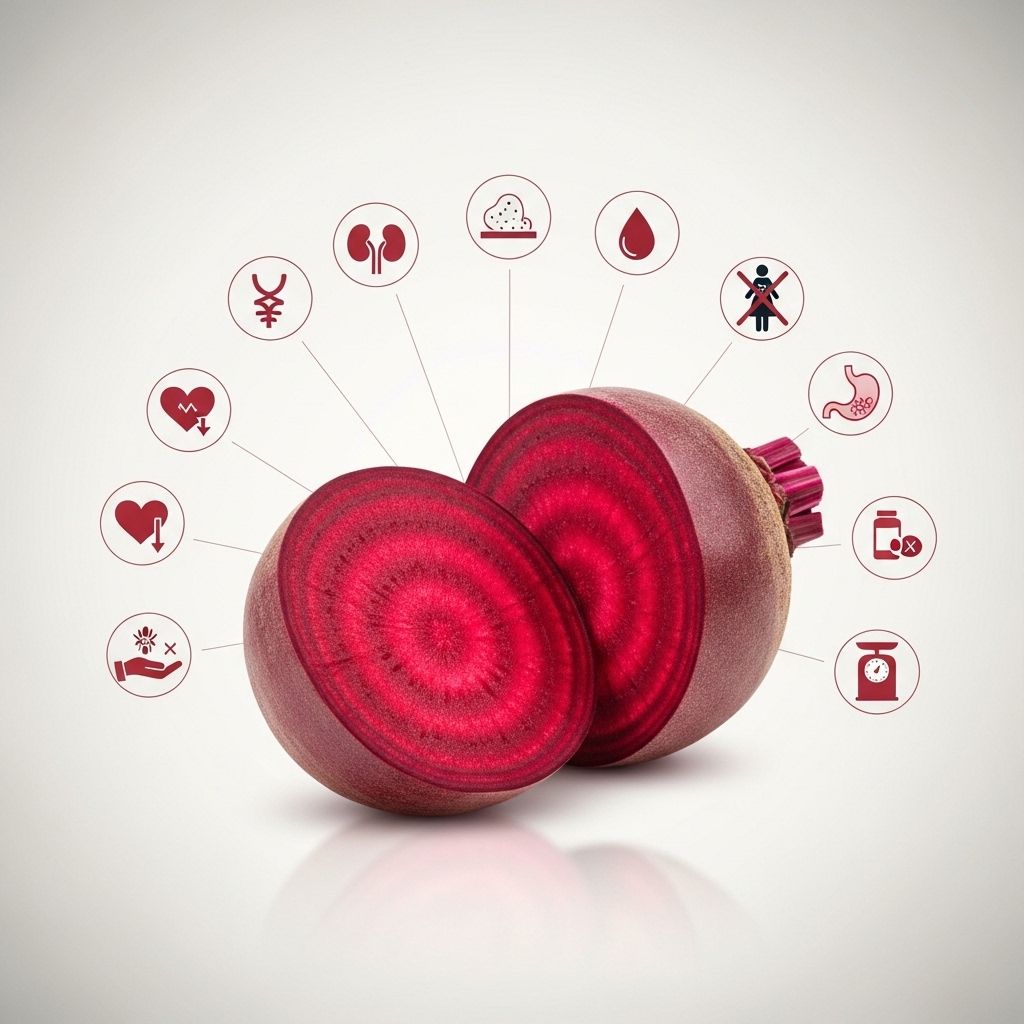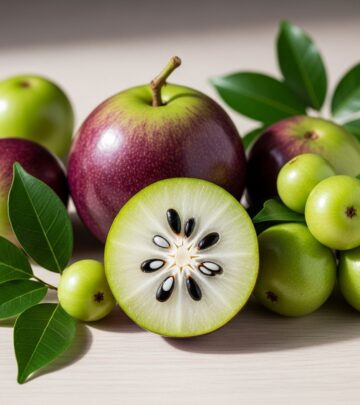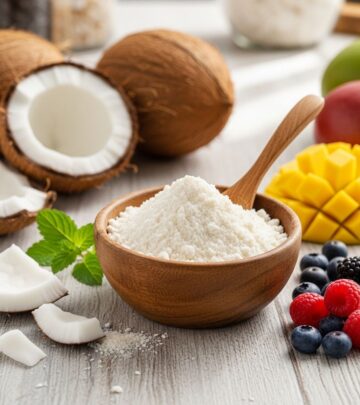The Hidden Risks of Beetroot: Comprehensive Guide to Side Effects
Awareness of beetroot’s risks ensures safe enjoyment and supports wellness.

The Serious Side Effects of Beetroot: What You Need to Know
Beetroot is celebrated for its impressive nutritional profile, packed with vitamins, minerals, antioxidants, and dietary fiber. It supports heart health, boosts immunity, and is a favorite ingredient in detox diets and fitness regimens. Yet, as with many foods, excessive consumption or individual sensitivities can trigger a range of adverse effects. This article provides an in-depth look at the factual side effects of beetroot, covering everything from digestive challenges to rare allergic reactions. Read on to discover why moderation is crucial, and how to enjoy beetroot safely.
Table of Contents
- Overview: Beetroot at a Glance
- Beeturia and Stool Discoloration
- Kidney Stones Risk
- Digestive Problems
- Drop in Blood Pressure
- Vitamin A Toxicity (Hypervitaminosis)
- Allergic Reactions & Anaphylaxis
- Liver Strain and Overload
- Methemoglobinemia
- Blood Sugar Spikes (Hyperglycemia)
- Potential Hair Loss
- Beetroot Powder: Extra Considerations
- FAQs
- Tips for Safe Consumption
Overview: Beetroot at a Glance
Beetroot, also known as table beet, is a versatile root vegetable cherished for its natural sweetness, earthy flavor, vibrant color, and unique nutritional benefits. Rich in folate, potassium, vitamin C, fiber, and beneficial plant compounds like betalains, beetroot is often called a ‘superfood.’ However, not everyone may safely enjoy beetroot in abundance, and certain side effects can arise based on quantity, individual health status, or specific sensitivities.
Beeturia and Stool Discoloration
One of the most instantly noticeable—but harmless—side effects of beetroot is Beeturia. This occurs when urine or stool turns pink or red after eating beetroot. Beeturia affects about 10–14% of the population and is due to the pigment betacyanin, not a sign of blood or serious illness. While alarming, discoloration typically resolves when beetroot consumption decreases.
Key points:
- Urine and stool may appear pink, red, or dark after eating beetroot.
- Beeturia is harmless, but if you notice red coloration without having eaten beetroot, consult a doctor to rule out medical conditions.
Kidney Stones Risk
Beetroot’s high oxalate content can pose risks to those susceptible to kidney stones. Oxalates bind with calcium, forming calcium-oxalate crystals which are the most common type of kidney stones.
Who should be cautious?
- Individuals with a history of kidney stones
- People with impaired kidney function
- Anyone on a high-oxalate diet
Certain preparations, such as beetroot juices and powders, may be especially concentrated in oxalates and pose higher risk.
Tip: Consult a healthcare provider before adding large quantities of beetroot to your diet, especially if you have a kidney condition.
Digestive Problems
While modest beetroot intake generally supports gut health, excessive amounts may lead to digestive discomfort due to high levels of fiber and fermentable carbohydrates.
Potential symptoms:
- Bloating
- Abdominal cramps
- Excessive gas production
- Diarrhea or loose stools
Beetroot’s acidity can also trigger discomfort, especially if consumed in juice form on an empty stomach. People with sensitive digestive systems or irritable bowel conditions should be extra cautious.
Drop in Blood Pressure
Beetroot is prized for its high nitrate levels, which help dilate blood vessels and lower blood pressure. However, excess intake may cause hypotension, manifesting as dizziness, fainting, or fatigue.
At-risk groups:
- Individuals with low blood pressure (hypotension)
- Those taking blood pressure medications
- Pregnant women (blood pressure especially sensitive)
Sudden drops in blood pressure can increase the risk of falls and related complications, particularly in older adults and those with cardiovascular conditions.
Vitamin A Toxicity (Hypervitaminosis)
Beetroot is rich in beta-carotene, which the body converts into vitamin A. High intake can lead to hypervitaminosis if consumed excessively over time.
| Symptoms of Vitamin A Toxicity | Description |
|---|---|
| Nausea & Vomiting | Often the earliest signs of excess vitamin A |
| Headaches | May be accompanied by dizziness and confusion |
| Bone & Joint Pain | Chronic overconsumption can lead to soreness |
| Vision Changes | Blurred vision, sensitivity to light |
| Skin Changes | Dry, peeling skin or redness |
Hypervitaminosis is less likely with normal beetroot intake but may occur with excessive use, especially in supplements or juices.
Allergic Reactions & Anaphylaxis
Although rare, some individuals may experience allergic reactions to beetroot, especially when consuming it in large amounts or for the first time.
- Signs of allergy include skin rashes, itching, swelling, and nausea.
- Severe cases may develop anaphylaxis: trouble breathing, throat tightness, and even shock.
Action: Discontinue consumption and seek immediate medical help if serious symptoms manifest.
Liver Strain and Overload
Excess beetroot can strain the liver’s detoxification pathways. Accumulation of minerals such as copper, iron, and betaine in the liver may be damaging over time.
Potential long-term risks:
- Liver dysfunction
- Fatigue and weakness
- Difficulty metabolizing other nutrients and medications
Liver strain is uncommon in healthy individuals but may occur in those with pre-existing liver conditions or those who consume beetroot excessively and regularly.
Methemoglobinemia
Beetroot’s nitrate content can very rarely lead to methemoglobinemia, a condition in which oxygen delivery in the blood is impaired. This is of particular concern for pregnant women and infants, but can affect sensitive adults as well.
- Symptoms: fatigue, headaches, trouble breathing, and dizziness
- Most cases recover completely once beetroot intake is reduced
- Consult a doctor if symptoms persist, especially in children or pregnant women
Blood Sugar Spikes (Hyperglycemia)
Beetroot has a high glycemic index (GI)—it’s rated around 64—which means it can raise blood sugar rapidly if consumed in large amounts.
- People with diabetes or those on blood sugar medication should exercise caution.
- Hyperglycemia is often an acute, temporary effect but can exacerbate chronic conditions if not monitored.
- Seek medical advice before including beetroot as a regular part of your diet if you have blood sugar concerns.
Potential Hair Loss
High levels of oxalates found in beetroot can interfere with the body’s absorption of minerals like zinc, which are essential for healthy hair.
- Mineral imbalance can weaken hair follicles, possibly resulting in increased hair shedding and thinning over time.
- This effect is rare and mainly occurs when beetroot is consumed in excess over prolonged periods.
Beetroot Powder: Extra Considerations
Beetroot powder is a popular supplement, but its concentrated nature heightens the risk of side effects already discussed, notably kidney stones, digestive issues, and allergic reactions.
Common side effects:
- Colored stools
- Beeturia
- Upset stomach
- Possible kidney stone formation (especially if oxalates are not removed)
- Allergic rashes or reactions
To minimize risks, always follow dosage guidelines and consult your healthcare provider before starting any new supplement routine.
Frequently Asked Questions (FAQs)
Q1: Is beetroot safe for everyone?
A: Most people tolerate moderate beetroot intake well. However, those with kidney stones, liver disorders, allergies, or low blood pressure should consume cautiously or consult a physician.
Q2: Can children eat beetroot?
A: In small amounts, yes. Very young children and infants are at slightly higher risk for methemoglobinemia due to beetroot’s nitrate content, so consult a pediatrician before including beetroot in their diet.
Q3: Is beetroot juice riskier than whole beetroot?
A: Juices tend to deliver higher concentrations of active compounds (including oxalates and nitrates), increasing the risk of side effects with excessive consumption. Whole beetroot typically contains more fiber, which moderates absorption.
Q4: Are beetroot supplements safe?
A: Supplements can be safe if used within recommended doses. However, the risks of kidney stones, digestive distress, and allergy may be higher, especially if label guidance isn’t followed.
Q5: How do I know if side effects are temporary or serious?
A: Most side effects (e.g., beeturia, mild digestive upset) resolve when you reduce beetroot intake. Persistent or severe symptoms (pain, swelling, difficulty breathing, dark urine or stool without beetroot intake) warrant medical attention.
Tips for Safe Consumption
- Practice moderation: Limit beetroot intake to 1 medium beetroot (or one cup) per day unless advised otherwise by your healthcare provider.
- Stay hydrated: Proper hydration helps flush excess oxalates from the kidneys.
- Monitor for symptoms: Track digestive changes, urine/stool color, or any allergic reactions, and adjust intake as needed.
- Consult professionals: If you have a history of kidney stones, liver issues, or chronic diseases, seek medical advice before increasing beetroot intake.
- Consider alternatives: Oxalate-free beetroot products or cooked beetroot (lower oxalate) may be safer for sensitive individuals.
Conclusion
Beetroot offers powerful benefits as part of a balanced diet, but the risks—from kidney stones to blood pressure drops and allergic reactions—underscore the need for moderation and awareness of individual health profiles. Being informed and attentive is key to making the most of this vibrant root vegetable without compromising well-being.
References
- https://blogs.umb.edu/today/9-surprising-beetroot-side-effects-you-didnt-know-avoid-digestive-issues-more/
- https://www.healthshots.com/healthy-eating/superfoods/side-effects-of-beetroot-juice-and-how-to-drink-it/
- https://www.performancelab.com/blogs/nutrition/are-there-any-side-effects-of-beetroot-powder
- https://nutrigardens.com/blogs/blog/beetroot-side-effects-and-reactions
- https://www.webmd.com/vitamins/ai/ingredientmono-306/beet
- https://www.medicalnewstoday.com/articles/beet-root-powder
- https://pubmed.ncbi.nlm.nih.gov/32292042/
Read full bio of medha deb













